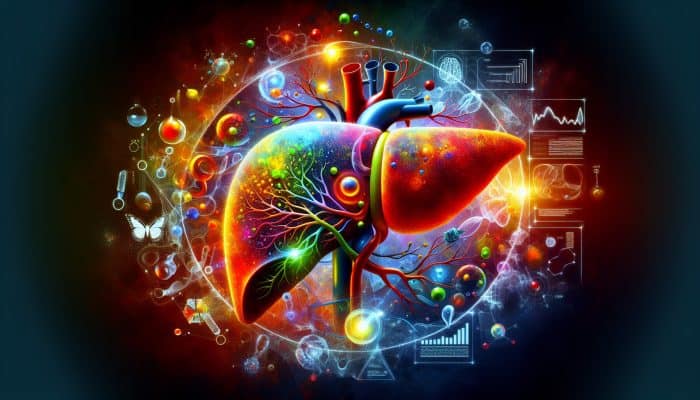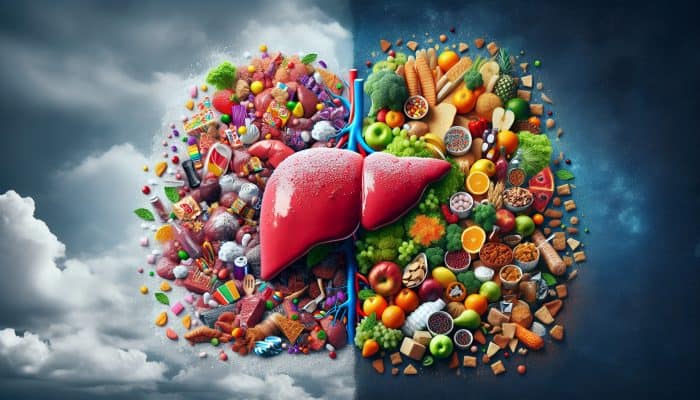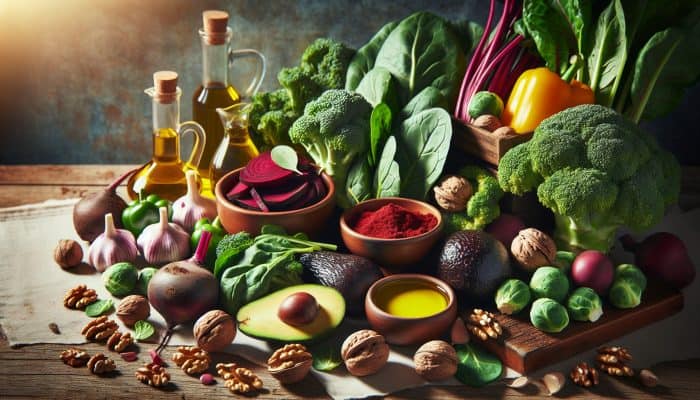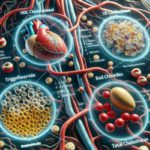Understanding the Intricate Mechanisms of Liver Detoxification
Essential Insights into the Liver Detoxification Process You Should Know

The liver detoxification process represents a sophisticated and multifaceted function that highlights the crucial role the liver plays in eliminating toxins from the bloodstream, a necessity for sustaining optimal health and overall well-being. This remarkable organ functions as the body’s primary filtration system, adeptly processing a wide array of harmful substances and facilitating their prompt removal. When the liver is functioning at its best, it not only protects the body from toxins but also aids vital metabolic functions, bolsters immune health, and maintains stable energy levels. To effectively enhance one’s health through informed dietary and lifestyle choices, it is imperative to acquire a thorough understanding of this intricate process.
The liver’s detoxification abilities are fundamental for preserving vitality and overall wellness. It converts toxins into less harmful compounds that can be efficiently expelled from the body. This transformative process is crucial in preventing the accumulation of dangerous substances, which could potentially lead to severe health complications. Thus, comprehending the mechanisms at play in liver detoxification enables individuals to make informed decisions regarding their nutritional intake and lifestyle choices, ultimately fostering improved liver health and enhanced overall well-being.
The Crucial Function of the Liver in the Body’s Detoxification System
The liver is an extraordinary organ that plays a central role in filtering blood that flows from the digestive tract. Its primary functions involve detoxifying a vast range of chemicals, metabolising drugs, and processing essential nutrients. Daily, the liver encounters numerous toxins derived from food, environmental pollutants, and metabolic waste. It skillfully distinguishes between beneficial nutrients and potentially harmful substances, ensuring that only advantageous compounds are absorbed while effectively neutralising and expelling the detrimental ones.
This essential filtering mechanism relies on intricate biochemical pathways. The liver’s specialised cells, known as hepatocytes, perform a multitude of tasks, such as converting ammonia into urea, synthesising vital proteins, and storing essential vitamins and minerals. By metabolising alcohol, medications, and various toxic substances, the liver plays an indispensable role in preventing the accumulation of harmful compounds, thereby safeguarding overall health and vitality.
Investigating the Detailed Mechanisms of Liver Detoxification
The complex liver detoxification process is categorised into two distinct phases: phase one and phase two. In phase one, the liver employs enzymes to transform fat-soluble toxins into more water-soluble compounds. This initial conversion can occasionally yield reactive intermediates that may be even more toxic than the original substances, underscoring the need for a swift transition to phase two.
During phase two, a process known as conjugation occurs, whereby these reactive intermediates are linked to another substance (such as <a href="https://limitsofstrategy.com/supplements-for-liver-health-key-benefits-explained/">glutathione</a>), effectively neutralising them. This vital phase prepares toxins for elimination via bile or urine. This two-phase detoxification framework is integral for maintaining cellular integrity and overall health. Any disruption in either phase can result in toxic accumulation, leading to a spectrum of health issues, including liver disease and dysfunction.
Key Factors Affecting the Efficiency of Liver Detoxification

The effectiveness of liver detoxification is influenced by an array of factors, including dietary habits, lifestyle choices, and environmental exposures. A diet high in processed foods, trans fats, and sugars can overwhelm the liver, significantly impairing its detoxification capabilities. In contrast, a balanced diet that emphasises whole foods can enhance liver function by providing essential nutrients vital for detoxification processes.
Lifestyle choices play an equally significant role. Regular physical activity boosts circulation and metabolic efficiency, further enhancing the liver’s detoxification efforts. Conversely, chronic alcohol consumption, smoking, and exposure to environmental toxins can severely undermine liver function and increase the risk of liver-related diseases. Additionally, stress levels and sleep quality are critical determinants of liver health, emphasising the importance of a holistic approach to wellness.
Natural Methods to Boost Liver Detoxification
Supporting liver health can be effectively achieved through natural strategies that strengthen its detoxification mechanisms. Prioritising a well-rounded diet is fundamental; integrating a variety of liver-friendly foods can significantly enhance the organ’s natural functions. Foods rich in antioxidants, such as leafy greens, cruciferous vegetables, and berries, can shield liver cells from oxidative stress and possible damage.
Moreover, maintaining adequate hydration is another essential factor. Water is vital for flushing out toxins from the body, thereby improving the liver’s efficiency. Additionally, incorporating spices like turmeric, known for its anti-inflammatory properties, can further amplify liver detoxification processes. Regular consumption of green tea is also advantageous, as it is rich in antioxidants that may enhance liver function. By adopting these natural strategies, individuals can considerably improve their liver health and optimise detoxification processes.
Expert Insights on Nutrition for Maximising Liver Detoxification
Identifying Optimal Foods to Promote Liver Health

Numerous foods have been extensively researched for their beneficial effects on promoting liver health and enhancing detoxification processes. These nutrient-dense options can significantly assist the liver in performing its vital functions. Key foods to consider include:
- Leafy greens (such as spinach and kale)
- Beets, celebrated for their high content of betaine
- Garlic, abundant in sulphur compounds that boost detoxification
- Cruciferous vegetables (like broccoli and Brussels sprouts)
- Avocados, rich in healthy fats
- Walnuts, which provide omega-3 fatty acids
- Olive oil, a source of healthy monounsaturated fats
- Turmeric, renowned for its anti-inflammatory properties
Integrating these foods into daily meals establishes a robust foundation for optimal liver health. Each of these items supports various aspects of liver function, from providing essential vitamins and minerals to enhancing detoxification processes. For instance, leafy greens are rich in chlorophyll, which aids in the elimination of toxins, while beets support bile production, a crucial component for fat digestion and detoxification.
How Do Dietary Choices Influence Liver Detoxification Processes?
The diet a person follows exerts a profound influence on liver health and its capacity to promote detoxification. Certain nutrients are vital for the liver’s ability to efficiently process and eliminate toxins. B vitamins, particularly B6, B12, and folate, are essential for energy production and detoxification pathways. Additionally, vitamin C acts as a powerful antioxidant, neutralising free radicals and protecting liver cells from damage.
Conversely, a diet high in refined sugars, unhealthy fats, and artificial additives can severely impede liver detoxification. Excessive alcohol consumption may lead to fatty liver disease, compromising the liver’s ability to detoxify effectively. Therefore, focusing on whole, nutrient-rich foods is crucial for supporting liver function and promoting overall health. Adopting dietary habits that favour fresh fruits, vegetables, whole grains, and lean proteins is essential for optimising liver health and enhancing detoxification capabilities.
Practical Examples of Successful Detox Diets
Real-world examples of effective diets can provide actionable insights for individuals looking to enhance liver detoxification. One prominent dietary pattern is the Mediterranean diet, which emphasises whole foods, healthy fats, and a diverse array of fruits and vegetables. This eating plan is rich in antioxidants and healthy fats, significantly bolstering liver function.
Another excellent example is a plant-based diet, which prioritises legumes, whole grains, nuts, and seeds. Individuals who adhere to this dietary pattern frequently report increased energy levels and enhanced detoxification, attributed to the high intake of fibre and essential nutrients. These dietary frameworks not only promote liver health but also encourage overall well-being by reducing the risk of chronic diseases. By adopting similar dietary habits, individuals can greatly enhance their liver health and overall quality of life.
Vital Nutrients for Promoting Optimal Liver Detoxification
Crucial Nutrients for Supporting Liver Health
Essential nutrients play a significant role in enhancing liver health and facilitating detoxification processes. Among these, B vitamins are indispensable for energy metabolism and supporting the liver’s detoxification pathways. Vitamin C serves as a powerful antioxidant that neutralises free radicals, thereby protecting liver cells from potential harm. Furthermore, glutathione, a potent antioxidant synthesised in the liver, is crucial for detoxifying harmful substances.
Minerals such as zinc and selenium are also essential for liver function, as they assist in enzymatic processes critical for detoxification. Incorporating foods rich in these nutrients is fundamental for maintaining optimal liver health. By understanding the significance of these nutrients, individuals can make informed dietary decisions that enhance their liver’s detoxification capabilities.
Enhancing Liver Detoxification with Antioxidants
Antioxidants play a pivotal role in protecting liver cells from oxidative damage caused by free radicals. These harmful molecules can accumulate due to metabolic activities, environmental pollutants, and poor dietary choices. By neutralising free radicals, antioxidants bolster the liver’s ability to detoxify effectively.
One of the most notable antioxidants is glutathione, produced in the liver and instrumental in neutralising toxins. Other antioxidants, particularly those abundant in fruits and vegetables, significantly contribute to maintaining liver health. For instance, berries, citrus fruits, and green leafy vegetables are rich in vitamins and minerals that support the liver’s detoxification processes. A diet abundant in antioxidants not only protects liver cells but also enhances the overall detoxification capacity of this vital organ.
Why Hydration is Critical for Optimal Liver Function
Maintaining proper hydration is vital for ensuring optimal liver function. Water plays a crucial role in numerous bodily processes, including the elimination of toxins. The liver requires sufficient water intake to filter and expel waste products effectively. Inadequate hydration can undermine the liver’s detoxification capabilities, leading to an accumulation of harmful substances within the body.
Consuming an adequate amount of fluids also aids digestion and nutrient absorption, further supporting the liver’s detoxification efforts. Herbal teas, especially those made with dandelion root or milk thistle, can be particularly beneficial, providing additional support for liver health. By incorporating a variety of hydrating fluids into one’s daily routine, individuals can ensure that the liver operates at its best, facilitating efficient detoxification.
Understanding the Role of Amino Acids in Liver Detoxification
Amino acids are integral to the detoxification processes of the liver, with specific amino acids, such as methionine and cysteine, being especially beneficial. These compounds serve as precursors to glutathione, one of the liver’s most powerful antioxidants. Maintaining adequate levels of glutathione is essential for detoxifying harmful substances, including heavy metals and environmental toxins.
Methionine can be found in protein-rich sources such as fish, poultry, and legumes, while cysteine is available in high-protein foods as well as certain vegetables, including garlic and onions. By ensuring an adequate intake of these amino acids, individuals can enhance their liver’s detoxification processes, ultimately supporting overall health. A diet that includes a variety of protein sources, alongside rich antioxidant foods, can significantly boost liver function and detoxification capabilities.
Research-Driven Insights on Nutrition for Liver Detoxification
Current Research on the Impact of Liver Detox Diets
Research is increasingly illuminating the effects of specific diets on promoting liver detoxification. Studies indicate that diets abundant in fruits, vegetables, and whole grains positively influence liver function. For instance, the Mediterranean diet has been associated with improved liver enzyme levels and decreased markers of fatty liver disease, clearly establishing a connection between nutrition and liver health.
Furthermore, certain food groups, particularly cruciferous vegetables, have been shown to enhance liver detoxification pathways due to their unique phytochemical profiles. These findings underscore the importance of tailored dietary interventions for individuals aiming to optimise their liver health. By embracing liver-friendly diets, individuals can support their detoxification processes and boost their overall well-being.
Practical Steps to Implement a Detox Diet
Implementing a liver detox diet can be accomplished through several actionable steps. First and foremost, it is essential to prioritise whole, nutrient-dense foods. Focus on incorporating a diverse array of fruits and vegetables into daily meals, aiming for at least five servings each day. Additionally, limit the intake of processed foods, refined sugars, and unhealthy fats, as these can significantly hinder liver function.
Moreover, consider integrating specific liver-supportive foods, such as garlic, turmeric, and beets, into your meals. Drinking sufficient water throughout the day is crucial for promoting effective detoxification. Herbal teas, like dandelion tea, can also provide additional beneficial effects. Finally, establishing a routine that includes regular physical activity is vital, as exercise plays an integral role in promoting liver health. By following these steps, individuals can create a nurturing environment for their liver and enhance its detoxification capabilities.
Utilising Supplements to Support Liver Detoxification
Supplements can offer additional support for liver detoxification, particularly when dietary sources may be lacking. Milk thistle is one of the most extensively researched supplements known for its liver-protective properties. Its active ingredient, silymarin, has been shown to enhance glutathione levels and support liver cell regeneration.
Another notable supplement, N-acetylcysteine (NAC), acts as a precursor for glutathione synthesis and can improve liver function, especially in cases of acetaminophen toxicity. While these supplements may provide significant benefits, they should always be used under the guidance of a healthcare professional. Regular monitoring of liver health through routine checks is essential to ensure that any supplementation aligns with individual health needs and circumstances.
Evaluating Lifestyle Choices and Their Influence on Liver Detoxification
Understanding the Risks of Alcohol Consumption for Liver Health
Excessive alcohol consumption poses a significant threat to liver health and its detoxification abilities. The liver metabolises alcohol through a complex process that can result in the accumulation of toxic byproducts. Over time, chronic alcohol intake can lead to conditions such as fatty liver, alcoholic hepatitis, and even cirrhosis, severely impairing the liver’s ability to detoxify effectively.
Reducing or abstaining from alcohol consumption is critical for individuals seeking to support their liver health. Emphasising a balanced diet rich in antioxidants and maintaining regular physical activity can help mitigate some of the adverse effects of alcohol. By making conscious choices regarding alcohol intake, individuals can significantly enhance their liver function and overall health.
The Importance of Regular Exercise in Promoting Liver Health
Regular exercise is vital for maintaining liver health and enhancing detoxification processes. Engaging in physical activity stimulates circulation and metabolic function, assisting the liver in its role of filtering and eliminating toxins. Exercise also promotes weight management, thereby reducing the risk of fatty liver disease, which can compromise liver function and detoxification capabilities.
Moreover, specific forms of exercise, such as cardiovascular workouts and resistance training, can enhance insulin sensitivity and metabolic efficiency, further supporting liver health. By incorporating exercise into daily routines, individuals can significantly benefit their liver’s detoxification processes and overall well-being.
The Detrimental Impact of Smoking on Liver Detoxification
Smoking introduces a plethora of harmful substances into the body, significantly increasing the liver’s workload. The toxins from cigarette smoke can impair liver function and inhibit its detoxification abilities. Over time, chronic smoking can lead to heightened oxidative stress and inflammation, contributing to liver damage and disease.
Quitting smoking is one of the most effective strategies for supporting liver health. By reducing exposure to harmful toxins and prioritising a nutritious diet rich in antioxidants, individuals can improve their liver’s capacity to detoxify effectively. A comprehensive approach that includes smoking cessation, dietary enhancements, and regular exercise can lead to substantial improvements in liver function and overall health.
How Does Diet Influence Liver Detoxification Mechanisms?
A balanced diet rich in whole foods is vital for supporting liver health and its detoxification capabilities. Foods abundant in antioxidants, such as fruits and vegetables, provide critical nutrients that protect liver cells from oxidative stress. Additionally, foods high in fibre, like whole grains and legumes, facilitate the elimination of toxins and support healthy digestion.
Conversely, diets high in processed foods, refined sugars, and unhealthy fats can overwhelm the liver, compromising its ability to detoxify effectively. Emphasising a diet that prioritises fresh, whole foods can optimise liver function, enhance detoxification processes, and improve overall health. By making deliberate dietary choices, individuals can profoundly impact their liver health and overall well-being.
The Connection Between Sleep and Liver Function
Adequate sleep is essential for liver health, as it plays a key role in the regeneration of liver cells and supports the body’s natural detoxification processes. During sleep, the body undergoes crucial repair and restoration, enabling the liver to perform its detoxification functions efficiently. Chronic sleep deprivation can hinder these processes, leading to an increased risk of liver-related issues.
Establishing a consistent sleep routine is crucial for promoting liver health. Aim for 7-9 hours of quality sleep each night to support the body’s natural rhythms and processes. Prioritising sleep, alongside a balanced diet and regular exercise, creates a holistic approach that enhances liver function and overall well-being.
Strategic Approaches for Maximising Liver Detoxification
Daily Practices to Promote Liver Health
Incorporating daily practices that support liver health can significantly enhance detoxification processes. Start by prioritising hydration; aim to drink at least two litres of water daily to aid in flushing out toxins. Including herbal teas, such as green tea or dandelion tea, can further promote liver function and overall health.
Adopting a balanced diet rich in whole foods is essential. Focus on consuming a variety of fruits, vegetables, whole grains, and lean proteins. Additionally, engage in regular physical activity to stimulate metabolism and promote detoxification. Establishing a consistent sleep schedule is equally important, as quality sleep plays a crucial role in liver regeneration. By embedding these habits into your daily routine, you can create an environment that fosters liver health and optimal detoxification.
Delicious Detox Recipes to Try for Liver Support
Simple detox recipes can serve as an excellent means to support liver function and enhance overall health. Consider the following recipes that incorporate liver-friendly ingredients:
- Green Detox Smoothie: Blend spinach, banana, flaxseeds, and almond milk for a nutrient-packed beverage.
- Beet and Quinoa Salad: Combine roasted beets with quinoa, spinach, and a drizzle of olive oil for a vibrant, nutritious dish.
- Garlic-Roasted Vegetables: Roast a medley of carrots, Brussels sprouts, and garlic in olive oil for a delicious side dish.
- Turmeric Golden Milk: Warm almond milk with turmeric, cinnamon, and honey for a soothing drink with anti-inflammatory benefits.
These recipes are not only simple to prepare but also rich in nutrients that support liver health. Incorporating such meals into your diet can enhance your overall well-being and promote efficient detoxification.
The Importance of Regular Health Check-Ups for Liver Monitoring
Regular health check-ups are vital for monitoring liver function and detecting potential issues early. Routine blood tests can assess liver enzyme levels and overall health, providing valuable insights into the liver’s condition. Identifying potential problems early allows for timely interventions that can significantly improve health outcomes.
Promoting regular health screenings and fostering open discussions with healthcare providers about liver health is crucial. Implementing lifestyle changes, such as a balanced diet and regular exercise, can further support liver function. By prioritising preventive healthcare, individuals can proactively manage their liver health and ensure optimal detoxification capabilities.
Frequently Asked Questions Regarding Liver Detoxification
What Symptoms Indicate Poor Liver Function?
Symptoms may include fatigue, jaundice (yellowing of the skin and eyes), abdominal discomfort, and unexplained weight loss.
Can Detox Diets Be Harmful to Your Health?
Some detox diets can be extreme and may lead to nutrient deficiencies. It is always advisable to consult with a healthcare professional before starting any detox programme.
How Often Should You Undertake a Liver Detox?
It is generally advisable to support liver health consistently through a balanced diet and lifestyle, rather than relying on intermittent detoxifications.
Are There Specific Foods to Avoid for Optimal Liver Health?
Limit the intake of alcohol, processed foods, refined sugars, and trans fats, as these can significantly impair liver function.
Can Staying Hydrated Really Improve Liver Function?
Yes, maintaining adequate hydration is crucial for liver function, as it helps flush out toxins and supports metabolic processes.
How Does Chronic Stress Impact Liver Health?
Chronic stress can lead to negative health behaviours and may also contribute to liver inflammation and compromised detoxification processes.
Is It Safe to Take Liver Supplements?
While some liver supplements can be beneficial, they should be taken under the guidance of a healthcare provider to avoid potential interactions and side effects.
What Lifestyle Changes Can Enhance Liver Function?
Focusing on a balanced diet, regular exercise, adequate hydration, and quality sleep can greatly improve liver health and functionality.
Can Weight Loss Benefit Liver Detoxification Processes?
Yes, managing weight can reduce fat accumulation in the liver, thereby enhancing its detoxification capabilities and overall health.
Should I Consider More Frequent Liver Check-Ups as I Age?
Yes, regular check-ups become increasingly important with age to monitor liver health and detect potential issues early.
Connect with us on Facebook!
The Article Nutrition for Liver Detoxification: UK Guide Was First Published On https://acupuncture-frome.co.uk
The Article Liver Detoxification: A Comprehensive Guide for the UK Was Found On https://limitsofstrategy.com
The Article Liver Detoxification: Your Essential Guide for the UK found first on https://electroquench.com

